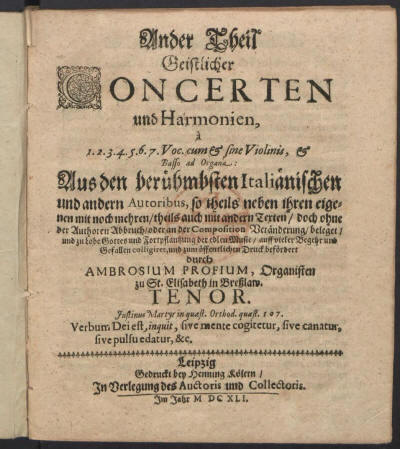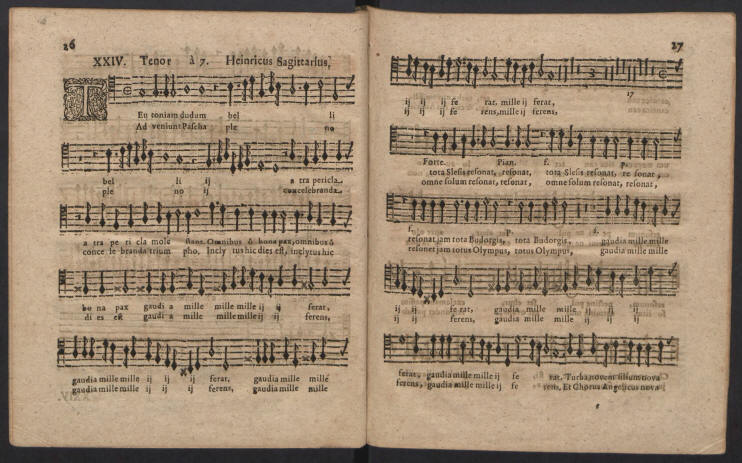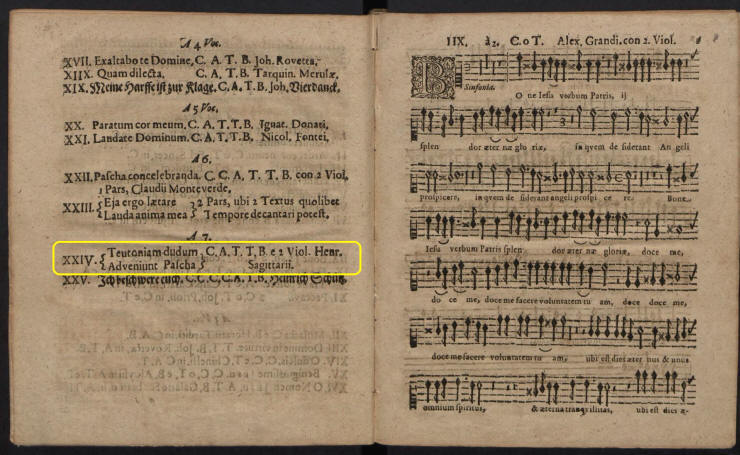Teutoniam dudum belli

Henrich Schütz
Teutoniam dudum Belli, SWV 338
à 7 (= 5vv (SSATB) + 2 violins, basso continuo)
First published: 1641 in Geistlicher
Concerten, Ander Theil (Ambrosius Profe), no. 24. Printer Henning Köler,
Leipzig. Ambrosius Profe was the compiler, editor.

Generally considered to have been written for the same ceremony as the syncharma musicum: the oath of loyalty of the Silesian Princes to Johann Georg I in november 1621 in Breslau . The publisher (Ambrosius Profe, from Breslau) announced on the title page that some of the pieces have an 'alternative text'. And indeed, this is one of those: Below the original text (about peace for Silesia) there is a 'song for Easter' (it fits perfectly, by the way. So musicians, feel free!). Author of the texts unknown. Although generally assumed, there is no reason/indication that Schütz provided this secondary text (the primary text from 1621, perhaps1641). 1641 = 20 years post factum, and many in Silesia were capable of writing such a text. Both text, I publish below, with a translation. As in Syncharma Musicum : 5 disticha consisting of an hexameter and a pentameter. Both the text and the music sound less political. Noteworthy: the repetition (almost a 'refrain') of the phrase ending with milla gaudia... Quite virtuoso passages.
| Latin | English |
| Teutoniam dudum belli atra pericla molestant, Omnibus o bona pax gaudia mille ferat. Laetentur cives patulo gens omnis in orbe In patria dulci prosperitate nova. Tota Slesis resonet, resonet jam tota Budorgis*, Omnibus o bona pax gaudia mille ferat. Turba novem Silium (not filium**) nova cantica cantet Apollo aureolo resonum pectine pulset ebur, exclamant passim Charites hominesque venusti: Omnibus o bona pax gaudia mille ferat. |
For a while war's dark dangers troubled
the German lands: To all, o good peace, bring thousand joys. May all citizens far and wide rejoice, all people of the region enjoy the new prosperity in the dear fatherland. May all of Silesia and Budorgis now resound: To all, o good peace, bring thousand joys. let the band of 9 (Muses) sing new songs about Silesia, let Apollo, with his golden plectrum, pluck the ivory lyre and the Graces all around and the best of men cry out: To all, o good peace, bring thousand joys. |
| Alternate text Adveniunt pascha pleno concelebranda triumpho. Inclytus hic dies est gaudia mille ferens. Nunc totus gaudet populus, nunc bruta per orbem Innumerum ludunt luxuriosa novum. Omne solum resonat, jam totus Olympus: Inclytus hic dies est gaudia mille ferens. Et chorus angelicus nova cantica cantat, et ante aera non solito carmine mulcet ovans, respondet passim juvenumque senumque caterva: Inclytus hic dies est gaudia mille ferens. |
Alternate text Let's celebrate the triumphant arrival of Easter. Glorious is this day, bringing thousand joys. Now all people rejoice, every creatures plays, delighted, throughout the vast renewed earth. The whole earth, yes all of Olympus, resounds: Glorious is this day, bringing thousand joys. The choir of angels also sings new songs and before it soothes the air, exulting in an exceptional song, from all around the crowd of young and old replies: Glorious is this day, bringing thousand joys. |
NB:
* Budorgis = name of a city in Ptolemaeus Geographica (daar
Boudoris, of Boudorigis) ergens te localiseren in 'magna Germania'. In de nieuwe tijd
poogde men in Silezië aan te tonen dat men niet tot
de 'barbaarse volken' behoorde, maar een respectabele traditie had. Het
bestaan van een stad in die regio (vanaf 1504 geïdentificeerd met Breslau)
aan het begin van de jaartelling, duidt op civilisatie. Zo ontstaat een
'oorsprongsmythe' en een 'nationaal gevoel'. De volgende stap was
Silesie met Elisië (de Elysese velden, paradijselijk vredig)
te identificeren. Dit woordspel neemt Schütz op in de eerste regel van
Syncharma Musicum.
** All editions I know of transcribe 'filium'. This is simply wrong. All three voices read 'Silium' (one of the Latin forms to describe of Silesia). This makes sense. Altus and Bassus even with a capital 'S' ! Tenor with a lowercase 's' which can indeed cause confusion. Evidence:


